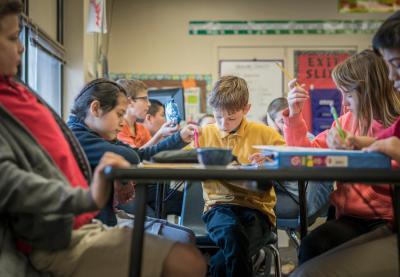How did the idea come about to teach a Racism and White Privilege class at your school?
We were inspired by a student’s senior project last year on racism and white privilege. He started a weekly white privilege study and conversation group and opened it up to the community. That was the seed. We thought, Hey, this is really powerful and helpful in our community in the rural South.
Our county is 96 percent white. There are subtle racial tensions at the high school. There are Confederate flags flying, and a Confederate rally came through our town recently. We don’t have many avenues to talk about this as a community. And we're learning of stories about people feeling they don’t belong or do not feel welcome in their hometown because of the color of their skin.
In order to live in a world that's more compassionate and just, we have to start having these conversations. It feels important for me as a white person to deconstruct what it really means to be white.
How have you structured the curriculum for the class this semester?
We’re pulling from the educator and social activist John Greenburg, who teaches about race and racism, classroom dialogue and civic engagement. We also use a white privilege study curriculum put out by the United Church of Christ. We’ve pulled from several different curricula to create one that's relevant and appropriate to our community. But we certainly don't enter this like, "Oh, we're experts on white privilege and we’re going to deliver content and teach you all what we know." It's more of a collective exploration. We’re being transformed by this, too.
We studied the historical context of Woody Guthrie’s song “This Land Is Your Land,” comparing it to the song “God Bless America.” Guthrie’s song was a response to “God Bless America,” which is very bright and light. Guthrie wrote about immigrants, about people who are hungry and in need. It was a call to action, shining light on some darker places in our culture.
We collaborated with a professor and musician from Radford University who came down with his guitar, and we sang the song together. Students added their own lyrics to the song and we sang them together. That was uncomfortable because we asked students to be creative. We learned that making music is terribly vulnerable and uncomfortable for people. It's a great way to navigate discomfort.
Then we talked about the personal strategies we use to navigate our discomfort. For instance, students said, "When I get uncomfortable and I breathe, it helps me," or, "If I am honest about my discomfort, that helps me."
We have the list up on the wall now so we can refer back to it and ask them, “What strategy are you using right now? Are you shutting down?”
We used the Let’s Talk! self-assessment from Teaching Tolerance. Students answered questions like, “What are you afraid of happening if you bring up this conversation?” “What are your strengths and what are your needs?” “What are your vulnerabilities?” It’s generally used with teachers, but I used it with students.
It led to a conversation about the ways in which students are afraid of being exposed. Some of them feel nervous about not knowing enough about the history of the civil rights movement. They feel vulnerable about being judged if they think differently from the group. We spoke about what could help them in their process.
We posted those self-assessments on the wall, and we’re going to create group norms and agreements from those vulnerabilities, strengths and needs.
We also talked about immigration as it relates to current events, like DACA and Trump’s presidency. We examined Kendrick Lamar’s Grammy performances as a call to action and analyzed The Help, reading critiques of the film and learning about Jim Crow laws.
What has your class’s impact been on your community?
There may also be an oral history part of the project, collecting stories about the experiences of black people in our town. We didn't plan on this, but the students are super excited about it. They want to do something that makes a difference in our town. A handful of them spoke at our last class, saying, "I really want to do something that helps Floyd become more integrated.”
What do you hope for as an ultimate outcome for the course?
I would like for that to become a platform for us to launch something more sustainable, something regular where our community can come together. I really don’t want this to be a one-off thing.
Ehrenhalt is the school-based programming and grants manager at Teaching Tolerance.
Learn more about the Teaching Tolerance Educator Grants program and apply for your own grant here!


0 COMMENTS